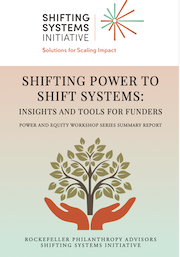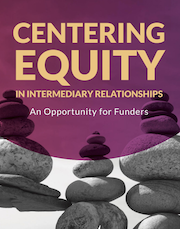Site Search
- resource provided by the Forum Network Knowledgebase.
Search Tip: Search with " " to find exact matches.
You will have an opportunity to learn about the collaborative process that resulted in this first version of the framework. In addition, you will hear from peers and practitioners who contributed to the development of the framework. Don't miss this opportunity to gain a deeper understanding of the framework's design principles and how they foster equity, transparency, and responsible AI adoption.
Speakers
Jean Westrick, Executive Director, TAG
Gozi Egbuonu, Director of Programs, TAG
Who Should Attend
Grantmaking Executives
Philanthropy Tech Professionals
Program Managers
Technology Leaders
AI for Good Enthusiasts and Advocates
COST: Free for CNJG Members and Non Member Grantmakers
Jean Westrick, Executive Director
Technology Association of Grantmakers
Jean Westrick is the Executive Director of the Technology Association of Grantmakers, a nonprofit organization that cultivates the strategic, equitable, and innovative use of technology in philanthropy. Westrick brings two decades of experience building communities, leveraging technology, and leading innovative and programmatic strategies. Prior to being named Executive Director of TAG, Westrick was the Director of IT Strategy and Communications at The Chicago Community Trust where she led change management efforts for the foundation’s $6M digital transformation initiative. Also, while at The Trust, Westrick directed On the Table, an award-winning engagement model designed to inspire resident action that was replicated in 30 cities nationwide. A longtime advocate for equity in STEM education, expanding technology access and increasing science literacy, Westrick holds a Bachelor of Arts from Michigan State University and a Master of Science from DePaul University.
Gozi Egbuonu, Director of Programs
Technology Association of Grantmakers
Gozi Egbuonu is the Director of Programs at the Technology Association of Grantmakers (TAG), a nonprofit organization with a mission to cultivate the strategic, equitable, and innovative use of technology in philanthropy. Prior to TAG, Gozi was an Impact Officer at Network for Good’s (now Bonterra) capacity-building program called Jumpstart. Through her advocacy for philanthropic investments in the technological capacity of talented nonprofit leaders and organizations throughout the United States, Gozi helped generate more than $500,000 in capacity-building funds to help nonprofits become more sustainable. In addition to helping generate lasting impact for nonprofits, Gozi created meaningful content and events aimed at educating philanthropic communities on the power of trust-based partnerships between grantmakers and nonprofits. Committed to using technology to improve lives and advance social change, Gozi is researching the use of medical technology to improve healthcare delivery while earning her doctorate in behavioral health from Cummings Graduate Institute. She also holds a Bachelor of Fine Arts from Washington and Lee University, a Master of Arts from Pepperdine Graduate School of Education and Psychology, and a Master of Science from the University of Rochester School of Medicine and Dentistry.


Times of mass mobilization like the uprisings for Black lives and global crises like the COVID pandemic broaden awareness of the work of organizations, collectives, and other groups of people working to transform harmful systems. Some of these groups turn to intermediaries—fiscal sponsors and donor intermediaries—to provide back-office support, grant funding, and other services to support their ongoing work and evolution.
This report explores the ways in which the ecosystem of funders and intermediaries can better support these groups—which we’re calling “constituent-led groups”—who do their work without formal 501c3 status and are often led by and supporting historically oppressed communities.
Today, many constituent-led groups, particularly those that are smaller and geographically isolated, struggle to find fiscal sponsors and other intermediaries that share their values and can provide services that are deeply rooted in racial equity. For a number of reasons, funders—who can’t otherwise support constituent-led groups—often prioritize partnering with intermediaries with a high capacity for scaling services and distributing resources and funds. Though equity values are important to funders in selecting intermediaries to partner with, many funders don’t know what equity-centered services look like or how to support intermediaries in deepening this work.
In this report, we share different ways fiscal sponsors and donor intermediaries have approached deepening equity in their work while meeting the volume of demand from constituent-led groups and funders. We also offer some pathways forward for funders seeking to strategically invest in intermediaries to strengthen their capacity in these areas so they might better serve constituent-led groups.
A collection of the President's letters to CNJG Members from the monthly newsletter.
- Summer Reading List (8/7/2025)
- Summer Happenings (7/8/2025)
- Spring Conference News (6/4/2025)
- Spring Conference Update (5/8/2025)
- Spring Conference Registration Open (4/2/2025)
- March Updates (3/7/2025)
- Federal Policy Changes (2/7/2025)
- Happy New Year! (1/9/2025)
- Reflect on the Impact We've Made and the Exciting Possibilities Ahead (12/5/2024)
- As We Look to 2025 (11/8/2024)
- CNJG Annual Meeting & Holiday Gathering (10/8/2024)
- Programs Update (9/5/2024)
- Summer Reads (8/7/2024)
- Update on CNJG Programs (7/8/2024)
- Upcoming Colloquium (6/5/2024)
- AI is Changing our World (5/10/2024)
- 2024 Spring Colloquium (4/5/2024)
- Foundations on the Hill 2024 (3/8/2024)
- Sad News (2/8/2024)
- Welcome to the New Year! (1/8/2024)
- Mad Dash to the End of the Year (12/8/2023)
- Collaboration (11/6/2023)
- CNJG Annual Meeting & Holiday Gathering (10/5/2023)
- Welcome Back From the Summer (9/5/2023)
- 2023 New Jersey Philanthropy Benefits & Salary Summary Report (7/5/2023)
- Great Turnout (6/9/2023)
- Upcoming Conference (5/3/2023)
- Back in Person (4/6/2023)
- Foundations on the Hill Update (3/6/2023)
- Amplify Our Collective Voice (2/6/2023)
- Annual Meeting Recap (1/6/2023)
Food is essential. But how often do you consider where your food comes from?This issue of What Funders Need to Know from the Washington Regional Association of Grantmakers explores the stages of the food system, from production all the way to disposal. Why is this important to philanthropy?
Because hunger, food insecurity, nutrition-related chronic disease, the health of resource lands and waterways, wages, and equal opportunity in the food economy all converge in our regional food system.

Seeking ways to maximize the social and economic returns of their place-based impact investments, foundations, CDFIs, private investors, and others are turning to collaboration. To support these efforts and facilitate lesson sharing, the Urban Institute and Mission Investors Exchange have produced a set of three practitioner briefs designed to focus on elements of place-based impact investing that have surfaced in research and conversations with practitioners as opportunities for knowledge exchange: building strong ecosystems, mapping opportunities and capacities, and deploying capital on the ground together through impact investing collaborations. Each brief presents the concept, highlights practitioner examples, and elevates lessons from the field.

